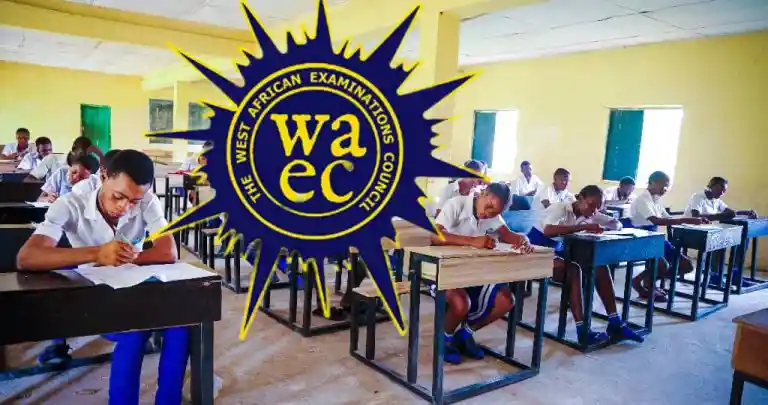The West African Examinations Council (WAEC) has come under renewed public scrutiny after the pass rate for the 2025 May/June examination in Nigeria surged from 35% to 68% following a temporary shutdown of its result-checking portal.
The change, which WAEC attributes to a “technical error” in its marking and result-processing system, has prompted both relief and scepticism among students, parents and education experts.
Initial Outcry Over Massive Failure
When results were first released last month, many students and schools reported what they described as an unusually high rate of failure, particularly in English Language — one of the core subjects required for admission into Nigerian universities.
The initial figures showed that only about 35% of candidates obtained credit passes (grades A1 to C6) in both English Language and Mathematics, the minimum benchmark for most tertiary institutions.
On social media, hashtags such as #WAECFailure and #RemarkOurPapers began trending as thousands of candidates shared screenshots of their grades, with many complaining that they had performed far below expectations.
“I studied hard, wrote well, and expected at least a C in English. When I saw D7, I was shocked,” said 17-year-old Deborah, a student in Lagos. “I thought it was a mistake.”
Also Read : WAEC 2025: Exam Board Blames Bugs for Massive Failure, Tells Students to Recheck Results Friday
Portal Shutdown and “Bug” Admission
Within days of the outcry, WAEC shut down its result-checking portal, citing the need to address “technical irregularities” detected during routine post-release checks.
In a statement, WAEC’s Head of National Office in Nigeria described the issue as a “bug” in the result compilation process.
“We discovered anomalies that may have affected the accurate reflection of candidates’ performance,” the statement read. “As part of our quality assurance measures, we temporarily disabled the portal to allow for thorough revalidation.”
Results Adjusted, Pass Rate Rises
When the portal reopened, many students reported significant upward adjustments to their grades.
Checks by TJ News Nigeria and corroborated by BBC analysis of sample results show that some candidates’ grades in English Language shifted dramatically — in some cases from a failing F9 to a near-pass D7, and from D7 to a solid credit such as C4 or even B3.
The impact on the overall statistics was immediate: the pass rate for candidates securing credits in both English Language and Mathematics rose from 35% to 68%.
For some students, the changes meant the difference between repeating the examination and proceeding directly to university admissions.
“I was preparing to register for another exam,” said Yusuf, an 18-year-old candidate from Kano. “Now, with my C4 in English, I can apply to my preferred university.”
Not All Results Changed
However, the adjustments were not universal.
A review of candidates’ results indicates that some students’ grades — particularly in English Language — remained exactly as before, despite the system review.
WAEC has not provided detailed data on how many grades were altered, nor the precise nature of the “bug” it identified.
Mixed Reactions
The grade changes have generated mixed reactions.
For many students and parents, the adjustments have brought relief. “We are grateful WAEC looked into the matter and corrected the mistakes,” said Mrs. Omotayo, a mother in Ogun State. “Our children’s futures should not be damaged by a technical problem.”
But education analysts and some members of the public have expressed concern about the credibility of the examination process.
“This is not simply a clerical error — this is a national examination whose results determine academic progression for hundreds of thousands of young people,” said Dr. Kemi Adebayo, an education policy researcher at the University of Ibadan. “A jump from 35% to 68% raises serious questions about the marking, moderation, and IT systems in use.”
WAEC’s Response
WAEC insists that its marking process remains credible and that the adjustments reflect the correction of an isolated technical fault rather than any deliberate inflation of grades.
“WAEC does not award marks arbitrarily,” the organisation said in a follow-up statement. “Every grade now published has been duly verified to ensure it matches the candidate’s true performance in the examination.”
It also announced plans to commission an independent review of its result-processing systems to prevent a recurrence.
Broader Implications
The incident has reignited debates about the reliability of public examination systems in Nigeria. WAEC, alongside the National Examinations Council (NECO) and the Joint Admissions and Matriculation Board (JAMB), plays a critical role in determining access to higher education.
Any perception of unreliability, experts warn, could erode public confidence.
“It’s not just about this year’s candidates,” Dr. Adebayo noted. “When employers, universities, or foreign institutions begin to question the validity of WAEC results, it affects every certificate holder.”
Call for Transparency
Several civil society groups have called on WAEC to publish a detailed audit explaining:
- How the bug occurred.
- How many candidates were affected.
- The specific steps taken to adjust results.
“Without full transparency, the public will continue to speculate,” said Ayodele Oladimeji, coordinator of the Education Rights Coalition. “We need to know that such errors will not happen again.”
Looking Ahead
With the 2025 admissions process already underway, universities across Nigeria are now processing applications that reflect the adjusted WAEC grades.
The Joint Admissions and Matriculation Board has stated that it will accept the updated results as officially issued by WAEC.
For candidates like Deborah, who saw her grade move from D7 to C4, the change is life-altering. “I can now apply for courses I thought were out of reach,” she said. “I just hope nothing like this happens again.”
About WAEC
The West African Examinations Council is a regional examination body established in 1952 to conduct standardised tests in English-speaking West Africa. Its certificates are recognised by universities in Nigeria, Ghana, Sierra Leone, The Gambia and Liberia, as well as by institutions overseas.
Editor’s note: This report is based on official WAEC statements, independent checks by TJ News Nigeria, and interviews with affected candidates and education experts. WAEC has been contacted for further clarification on the scope and nature of the technical fault.






